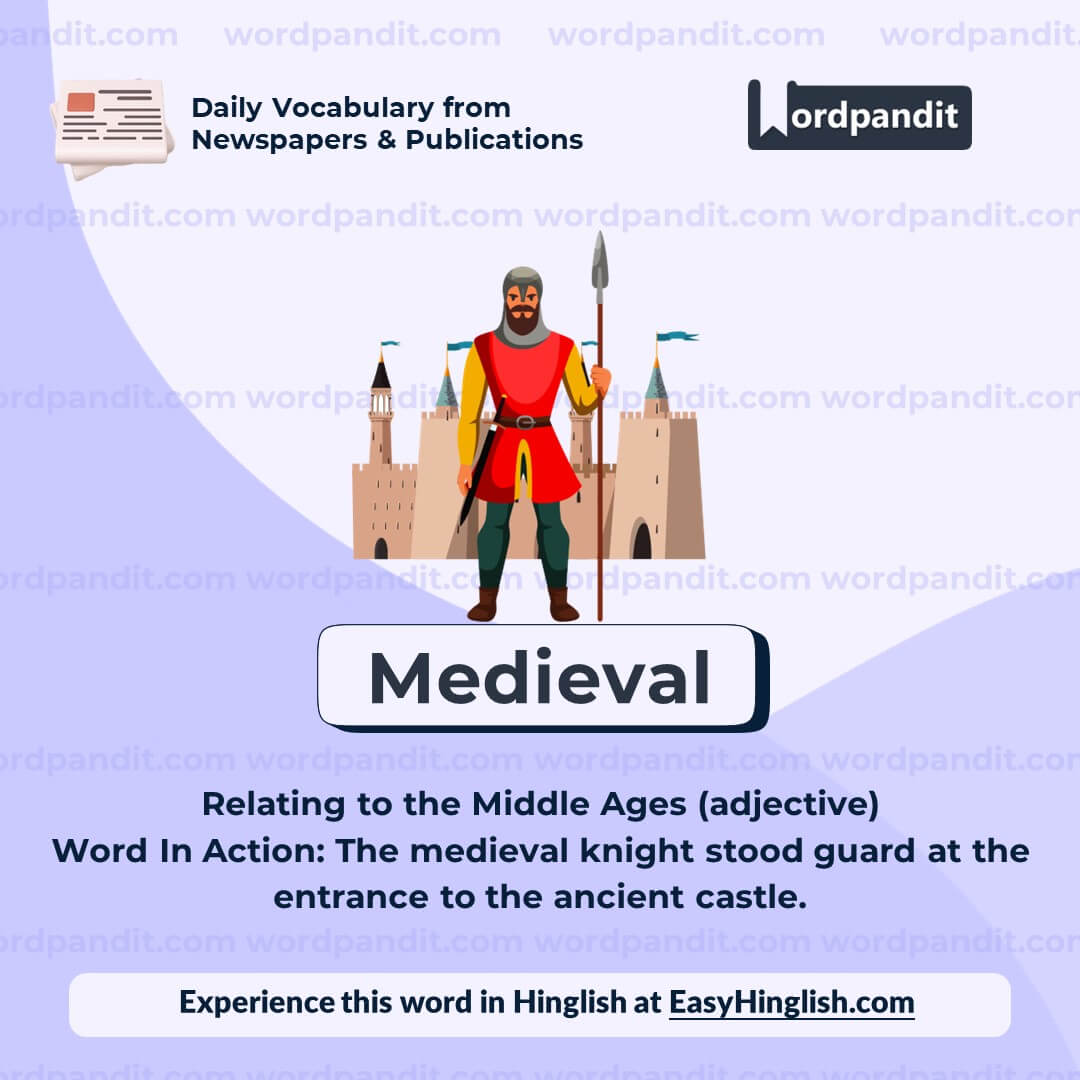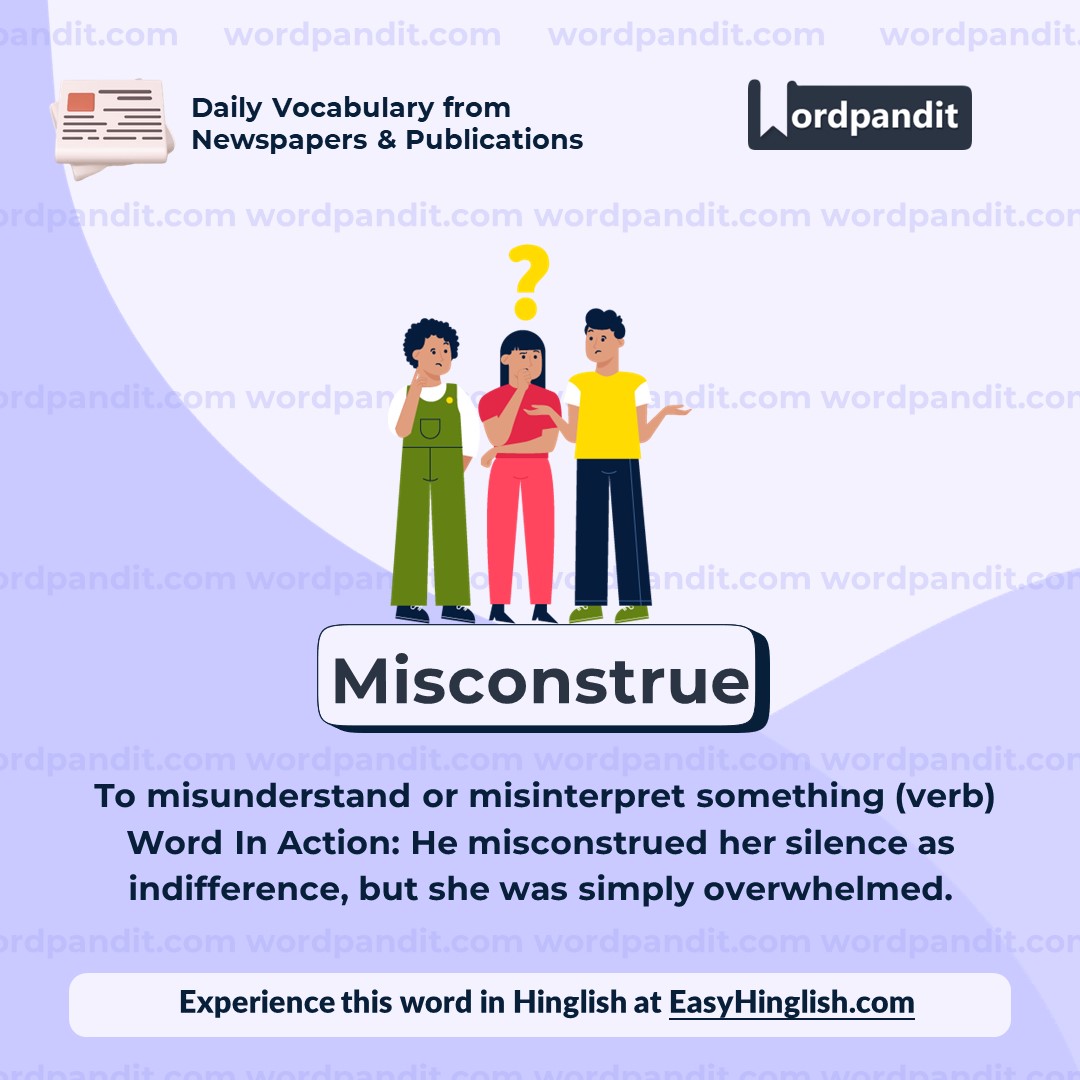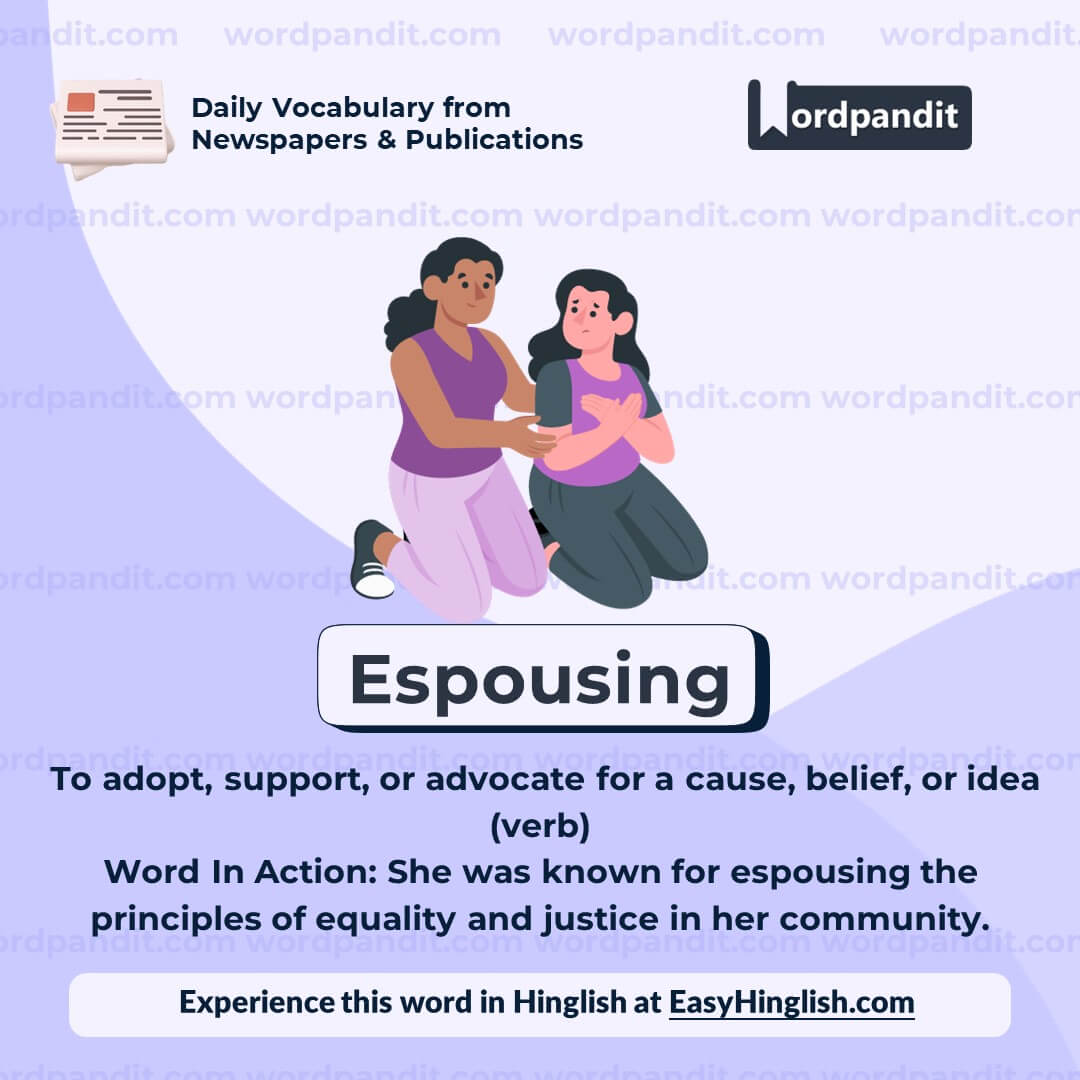Daily Vocabulary from International Newspapers and Publications
Expand Your Vocabulary with Wordpandit’s Global Vocabulary Hub
At Wordpandit, we are committed to helping you develop a truly global vocabulary by drawing from some of the most respected international publications. This section is designed to keep you ahead of the curve by introducing you to words that define global conversations and trends.
The Power of Global Sources
To help you think and communicate on a global scale, we curate vocabulary from renowned international sources, such as:
- The New York Times
- The Washington Post
- BBC
- The Guardian
- The Economist
- Scientific American
- Psychology Today
- And many more...
Stay Global, Stay Competitive
Our daily updates from international publications ensure you are consistently exposed to new words that reflect global news and developments, making sure your vocabulary is not only current but also globally relevant.
Enhance Your Global Perspective
Whether you’re preparing for international exams, aiming to excel in global business communication, or want to enhance your language skills for personal growth, Wordpandit offers the resources you need to thrive in a global context.
Effective Learning, Global Reach
Our learning methodology combines global examples, memory aids, and interactive activities, allowing you to internalize new words effectively and apply them in real-world scenarios.
Begin Your Global Vocabulary Journey Now!
Why Choose Wordpandit?
Practical Learning: Focus on words you'll actually encounter in real-world reading, enhancing your comprehension and communication skills.
Diverse Content: From current affairs to scientific breakthroughs, our varied sources expose you to vocabulary across multiple domains.
Effortless Integration: Make Wordpandit a part of your daily routine. Just a few minutes each day can significantly boost your lexicon over time.
Your Path to Vocabulary Mastery
- Visit our Daily Vocabulary section regularly
- Explore new words and their usage in context
- Practice incorporating these words into your own writing and speech
- Track your progress as your vocabulary expands
Start Your Journey Today
Embark on your vocabulary enhancement journey with Wordpandit. By consistently engaging with our daily posts, you'll build a robust vocabulary that serves you well in academic, professional, and personal contexts.
Remember, a word a day keeps linguistic limitations at bay. Make Wordpandit your daily companion in the quest for vocabulary excellence!
WORD-1: Medieval
Context:
"Manifest image (temperature, respiration, lightning) or will (some of) these phenomena go the way of the unicorns, gryphons and dragons of medieval bestiaries – entities that have no place within a scientifically informed catalogue of what there is? It is this question, more than any other, that lay at the heart of Dennett’s project." - Aeon
Explanatory Paragraph:
The word "medieval" refers to the period in European history roughly between the 5th and 15th centuries, often called the Middle Ages. This term is often associated with castles, knights, and a time before modern science and technology. In this context, it reflects the mythical or fantastical aspects of the period, like bestiaries that cataloged creatures such as unicorns and dragons, which were imagined rather than real.
Meaning: Relating to the Middle Ages (adjective)
Pronunciation: mee-dee-EE-vuhl
Difficulty Level: ⭐⭐⭐ Intermediate
Etymology: From the Latin words "medium" (middle) and "aevum" (age), meaning "the middle age."
Synonyms & Antonyms:
Synonyms: Middle Ages, feudal, archaic, Gothic
Antonyms: Modern, contemporary, present-day
Usage Examples:
- The castle's architecture was distinctly medieval, with high towers and thick stone walls.
- Some of the festival's traditions seemed almost medieval in their quaintness and charm.
- The professor specialized in medieval literature, focusing on works written during the 13th century.
- His outdated views on gender roles felt practically medieval to the younger generation.
Cultural Reference:
"Medieval bestiaries often included mythical creatures like unicorns and dragons, blending observation with imagination. These books were not just zoological; they often carried moral or spiritual lessons." - Historical Anthology
Think About It:
How did the medieval period shape the development of modern science and culture, despite being considered a time of limited knowledge?
Quick Activity:
Research a famous medieval landmark, such as Notre Dame Cathedral or the Tower of London, and write a brief paragraph about its historical significance.
Memory Tip:
Think of "medieval" as "the middle ages" by remembering the word starts with "medi," which is similar to "medium" or "middle."
Real-World Application:
The word "medieval" is often used metaphorically today to describe outdated ideas, practices, or systems that seem out of place in the modern world.
WORD-2: Prospects
Context:
"Different take on the prospects of intentional states was defended by Paul and Patricia Churchland. The Churchlands shared Fodor’s assumption that intentional talk attempts to capture the underlying causal structure of the mind." - Aeon
Explanatory Paragraph:
The word "prospects" refers to the possibility or likelihood of a future event or outcome. It is often used to discuss potential opportunities or developments in various contexts, such as careers, businesses, or abstract concepts like intentional states in the example. Here, it reflects the potential or outlook for understanding mental states through intentional talk.
Meaning: The possibility or likelihood of a future event, or a person's outlook for success (noun)
Pronunciation: PRAH-spekts
Difficulty Level: ⭐⭐ Beginner
Etymology: From the Latin word "prospectus," meaning "a view or outlook," derived from "pro-" (forward) and "specere" (to look).
Synonyms & Antonyms:
Synonyms: Outlook, chance, opportunity, potential, forecast
Antonyms: Impossibility, hopelessness
Usage Examples:
- The job prospects in the tech industry are looking promising this year.
- The company is excited about the prospects of launching a new product line.
- As a recent graduate, her prospects for finding a well-paying job were excellent.
- The scientist discussed the prospects of finding life on other planets.
Cultural Reference:
"Gold rush prospectors in the 19th century traveled far and wide, driven by the prospects of finding fortune in uncharted territories." - Historical Chronicle
Think About It:
How do personal attitudes and actions influence one’s prospects for success in life?
Quick Activity:
List three areas in your life where you see good prospects for growth, and write a short plan for how to maximize those opportunities.
Memory Tip:
Remember "prospects" by associating it with "looking forward" to opportunities or possibilities—just like a "prospector" searches for gold.
Real-World Application:
The word "prospects" is widely used in career planning, business strategies, and forecasting future outcomes, making it a practical term in both personal and professional settings.
WORD-3: Lethargy
Context:
"Physical symptoms: among these possible symptoms are fatigue and lethargy; feeling achy or heavy in the body; a loss of appetite or, conversely, an urge to eat for comfort; or disrupted sleep patterns." - Psyche
Explanatory Paragraph:
The word "lethargy" refers to a state of extreme tiredness or lack of energy, often accompanied by a sense of sluggishness or disinterest in activities. It can result from physical, emotional, or mental exhaustion and is sometimes a symptom of an underlying condition, as mentioned in the context. When someone experiences lethargy, they may struggle to perform even basic tasks.
Meaning: A lack of energy or enthusiasm; sluggishness (noun)
Pronunciation: LEH-thur-jee
Difficulty Level: ⭐⭐⭐ Intermediate
Etymology: From the Greek word "lēthargos," meaning "forgetful" or "inactive," which is derived from "lēthē" (forgetfulness) and "argos" (idle).
Synonyms & Antonyms:
Synonyms: Fatigue, sluggishness, listlessness, apathy, weariness
Antonyms: Energy, vitality, vigor, enthusiasm, liveliness
Usage Examples:
- After working long hours for weeks, he felt a deep sense of lethargy and needed a vacation.
- The humid weather left everyone in a state of lethargy, unable to do anything productive.
- Her lethargy was a symptom of an underlying illness that required medical attention.
- Overcoming lethargy often requires a mix of physical activity, proper nutrition, and rest.
Cultural Reference:
"In ancient Greek mythology, the River Lethe was said to cause forgetfulness and lethargy in those who drank its waters, symbolizing a loss of energy and memory." - Mythological Texts
Think About It:
What role do lifestyle factors such as sleep, diet, and exercise play in preventing or overcoming lethargy?
Quick Activity:
Identify three activities that give you an energy boost and schedule them into your day to combat lethargy.
Memory Tip:
Think of "lethargy" as "lethargic energy," where the word itself sounds like a slow and tired state.
Real-World Application:
Lethargy is commonly experienced during periods of high stress or burnout. Understanding its causes and adopting healthy habits can help prevent it, making the term relevant in discussions about mental and physical health.
WORD-4: Misconstrue
Context:
"In his view, both approaches are guilty of a common failing: they misconstrue the point of intentional-state talk. Drawing on the work of his mid-century heroes – most notably Ryle – Dennett argued that we appeal to beliefs, desires and intention." - Aeon
Explanatory Paragraph:
The word "misconstrue" means to interpret or understand something incorrectly, often leading to confusion or misunderstanding. In the given context, it refers to a misinterpretation of the purpose or point of discussing intentional states, which are concepts like beliefs and desires. Misconstruing something can result in flawed conclusions or judgments about a situation.
Meaning: To misunderstand or misinterpret something (verb)
Pronunciation: mis-KON-stroo
Difficulty Level: ⭐⭐⭐ Intermediate
Etymology: From the prefix "mis-" meaning "wrongly" and the Middle English "construe," which means "to interpret or explain."
Synonyms & Antonyms:
Synonyms: Misinterpret, misunderstand, misread, distort
Antonyms: Understand, interpret, perceive, grasp
Usage Examples:
- He misconstrued her silence as disapproval, though she was simply deep in thought.
- The lawyer argued that the opposing party had misconstrued the terms of the contract.
- The message was vague, and several readers misconstrued its true intent.
- It's easy to misconstrue someone's tone in a text message, leading to unnecessary confusion.
Cultural Reference:
"In Shakespeare's 'Julius Caesar,' the character of Brutus is often misconstrued as a villain, though his motives were rooted in loyalty to Rome rather than betrayal." - Classic Literature Analysis
Think About It:
How can we avoid misconstruing someone’s intentions, especially in emotionally charged situations?
Quick Activity:
Write a brief paragraph about a time when you or someone you know misconstrued a situation. Reflect on what caused the misunderstanding and how it was resolved.
Memory Tip:
Break the word into "mis-" (wrong) and "construe" (interpret), which makes it easy to remember as "wrongly interpret."
Real-World Application:
The word "misconstrue" is highly relevant in communication, legal settings, and everyday interactions. Understanding its meaning reminds us to clarify our intentions and seek precise understanding to avoid misunderstandings.
WORD-5: Espousing
Context:
"Some theorists consider Dennett as espousing eliminativist views about consciousness – making him a ‘consciousness denier’, as Galen Strawson once put it in The New York Review." - BBC
Explanatory Paragraph:
The word "espousing" means adopting, supporting, or advocating for a particular idea, belief, or cause. In the context provided, it suggests that Dennett is seen as promoting or supporting the eliminativist views about consciousness, which deny certain common assumptions about the nature of the mind and consciousness. To "espouse" something is to align oneself with it or publicly stand behind it.
Meaning: To adopt, support, or advocate for a cause, belief, or idea (verb)
Pronunciation: es-POW-zing
Difficulty Level: ⭐⭐⭐ Intermediate
Etymology: From the Old French word "espouser," meaning "to marry," which is derived from the Latin "sponsare," meaning "to pledge or betroth."
Synonyms & Antonyms:
Synonyms: Advocate, support, champion, endorse, uphold
Antonyms: Oppose, reject, refute, denounce
Usage Examples:
- She is known for espousing environmental sustainability as a core value in her business practices.
- Many activists are espousing the importance of mental health awareness in the workplace.
- In his book, the author espouses the philosophy of minimalism as a way to live a more fulfilling life.
- The politician faced criticism for espousing controversial policies that many viewed as outdated.
Cultural Reference:
"Mahatma Gandhi is often remembered for espousing nonviolence and civil disobedience as tools for political and social change, inspiring movements worldwide." - Historical Records
Think About It:
What beliefs or causes are you currently espousing, and how do they shape your decisions and actions?
Quick Activity:
Write a list of three causes or ideas you strongly believe in and explain how you could espouse them in your daily life.
Memory Tip:
Think of "espousing" as "spouse," someone you strongly support or commit to, just like a pledge in marriage.
Real-World Application:
The term "espousing" is often used in debates, political speeches, and activism to describe someone taking a public stance on important issues, making it a valuable word in discussions of advocacy and beliefs.


















